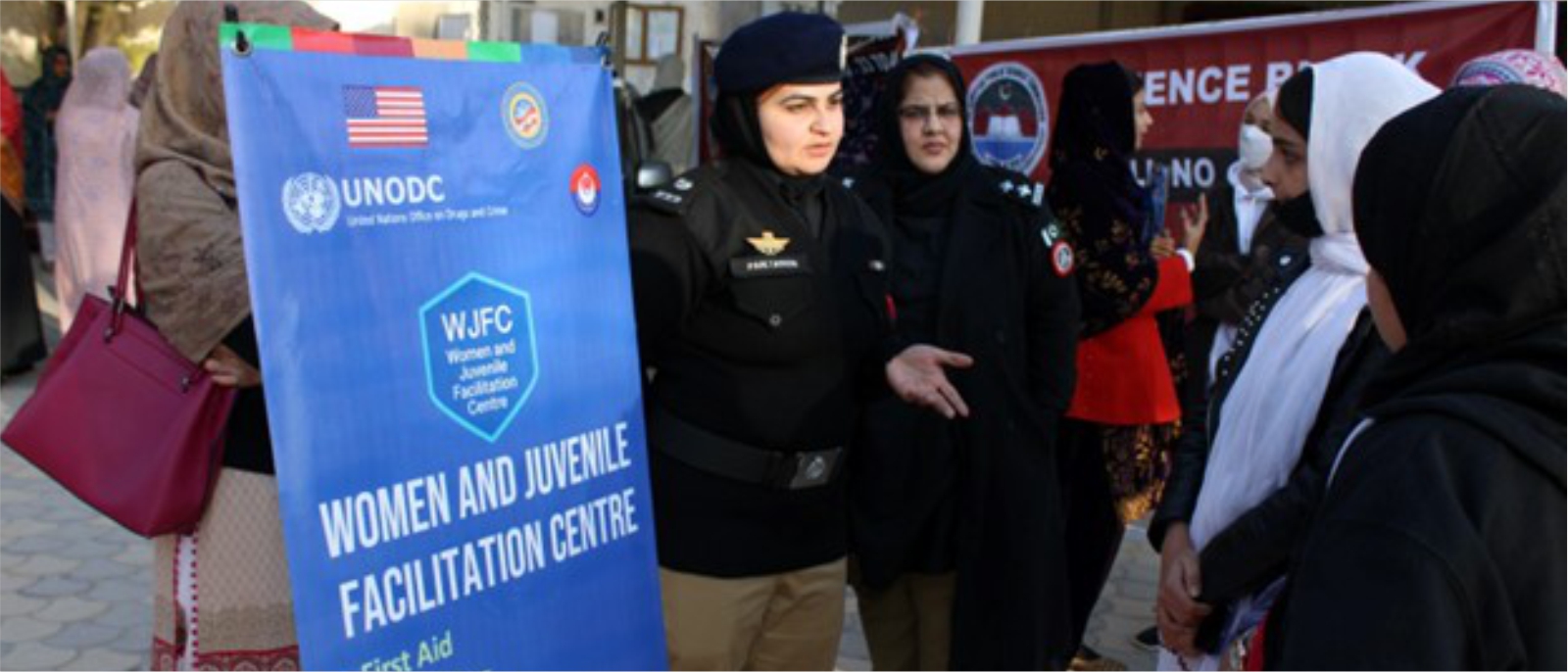
Ms. Pari Gul Tareen Superintendent Police Soan ICT Police giving insight on the facilities of WJFC Quetta.Photo Credits: UNODC Pakistan
“Accountable and transparent policing is good for the public, good for the police, and good for the safety and security of all."
Ghada Fathy Ismail Waly
Executive Director, UNODC
On the commemoration of International Day of Police Cooperation, the United Nations Inter-Agency Task Force on Policing highlights the importance of police integrity, accountability, and oversight in strengthening the rule of law, ensuring human rights-based and effective policing, and enhancing public trust towards law enforcement agencies.
UNODC Pakistan joined the global community to mark the International Day of Police Cooperation, highlighting the critical role of law enforcement in ensuring peace, security, and justice. This year’s theme, "Integrity, Accountability, and Oversight," emphasizes the core principles of effective policing.
In a country as diverse and complex as Pakistan, the police serve as vital frontline defenders of peace and security, committed to safeguarding all citizens, particularly the most vulnerable. In collaboration with the Government of Pakistan at both federal and provincial levels, UNODC Pakistan has played a key role in advancing reforms that have strengthened the professionalism, integrity, and inclusiveness of the police force nationwide. These reforms not only focus on improving service delivery but also emphasize the protection of human rights, with particular attention to women, children, and marginalized groups, including transgender individuals.
At the national level, UNODC continues its close collaboration with the National Police Bureau to strengthen policy frameworks that support these initiatives. By enhancing the legal and institutional structures that govern law enforcement, these partnerships aim to build a police force that is not only effective but also deeply rooted in principles of integrity, accountability, and human rights.
The International Day of Police Cooperation offers a unique opportunity to celebrate and acknowledge the indispensable role of the police in ensuring public safety and upholding law and order in Pakistan.
Across the provinces, UNODC has supported groundbreaking initiatives aimed at providing specialized services to vulnerable groups. One such example is the creation of Women and Juvenile Facilitation Centres, which offer essential legal support and protection to victims of gender-based violence. Abishay Busharat, a transgender victim support officer, who has been proactively working at the Balochistan Women and Juvenile Facilitation Centre, said, “I am proud to serve as Balochistan's first transgender Police Officer. I have confidence that effective policing goes beyond law enforcement, emphasizing the promotion and protection of human rights, the prevention of power abuse, and the maintenance of transparency at all levels.”
The importance of trust and transparency was echoed by Syed Ali Nasir, Inspector General of Police, Islamabad, who emphasized: “On the occasion of the International Police Cooperation Day, Islamabad Police aims to further strengthen our relationship of trust and mutual understanding with the residents of Islamabad.”
Pakistan launched a powerful social media campaign to commemorate the day, amplifying the voices of senior police officers across the country. The campaign highlighted the indispensable role of the police in safeguarding the nation and building public trust. Among those featured was Mr. Salman Choudhry, Inspector General of National Motorway and Highway Police, who stated:
Delivering public service with efficiency, professional integrity, and ensuring the highest level of public safety are the key principles of motorway police. To adhere to these principles, we must ensure strong accountability and effective oversight mechanisms to keep us on track and help maintain the public's trust in the motorway police.”
Women comprise only 15-20% of the global police force, UNODC’s support to police reform in Pakistan aims to address this gender imbalance. The inclusion of more women in law enforcement is not just about achieving gender parity but enhancing the overall capacity of the police to respond to crimes such as gender-based violence.
SP Soan ICT Police, Pari Gul Tareen, stressed, “There is a dire need to increase the number of women in the police service to better handle issues related to gender-based violence and crimes against vulnerable groups, including women and children.”
UNODC COPAK’s Officer-In-Charge, Mr. Arsalan Malik, reaffirmed the commitment to support ongoing reforms, ensuring the police force becomes more accountable, gender-inclusive, and people-centric. Through continuous collaboration, Pakistan’s police and UNODC are working toward a safer, more just society.
For further information https://www.un.org/en/observances/police-cooperation-day/messages